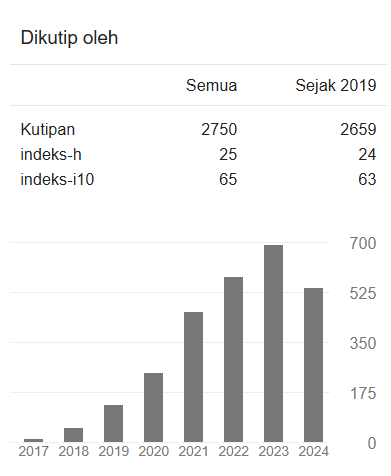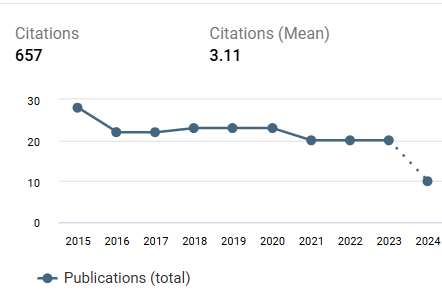Role playing as contextual learning to improve mathematical communication skills of madrasah ibtidaiyah students
DOI:
https://doi.org/10.22219/jinop.v10i2.34749Keywords:
Contextual Learning, Mathematical Communication Skill, Role-PlayingAbstract
Among the efforts to improve Mathematical Communication Skills (MCS) is to innovate learning models. This research aims to develop contextual role-playing learning products to improve Madrasah Ibtidaiyah (MI/ primary school) students’ MCS on valid and practical fraction material. The research and development (R&D) model of Define, Design, Development, and Dissemination (4D) was employed. The research subjects were second graders at MI Tahfidz El Muna Q, totaling 28 students. The instruments included validation guidelines, practicality guidelines, and MCS tests. Product effectiveness is tested using N-Gain. The results showed that the number of students completing the MCS after contextual role-playing learning was 89.28%, which is in the high category. The average N-Gain value obtained was 0.79, which is also in the high category. These findings show that contextual role-playing learning can potentially improve MI students’ MCS, especially in fraction material.
Downloads
References
Adiansha, A. A., Sumantri, M. S., & Makmuri, M. (2018). Pengaruh model brain based learning terhadap kemampuan komunikasi matematis siswa ditinjau dari kreativitas. Premiere Educandum : Jurnal Pendidikan Dasar Dan Pembelajaran, 8(2), 127. https://doi.org/10.25273/pe.v8i2.2905
Agus, I. (2019). Efektivitas guided discovery menggunakan pendekatan kontekstual ditinjau dari kemampuan berpikir kritis, prestasi, dan self-efficacy. Jurnal Riset Pendidikan Matematika, 6(2), 120–132. https://doi.org/10.21831/jrpm.v6i2.14517
Ahdhianto, E., Marsigit, M., Haryanto, H., & Santi, N. N. (2020). The Effect of Metacognitive-Based Contextual Learning Model on Fifth-Grade Students’ Problem-Solving and MCS. European Journal of Educational Research, volume-9-2020(volume-9-issue-2-april-2020), 753–764. https://doi.org/10.12973/eu-jer.9.2.753
Anggarani, F. K., Setyowati, R., Satwika, P. A., & Andayani, T. R. (2022). Pengaruh Pendidikan Literasi Keuangan dengan Pendekatan Bermain Peran pada Anak Usia Dini. Jurnal Obsesi : Jurnal Pendidikan Anak Usia Dini, 6(5), 3836–3845. https://doi.org/10.31004/obsesi.v6i5.1920
Arianti, N. Md., Wiarta, I. Wyn., & Darsana, I. Wyn. (2019). Pengaruh Model Pembelajaran Problem Posing Berbantuan Media Semi Konkret terhadap Kompetensi Pengetahuan Matematika. Jurnal Ilmiah Sekolah Dasar, 3(4), 394. https://doi.org/10.23887/jisd.v3i4.21765
Ariyana, I. K. S., & Suastika, I. N. (2022). Model Pembelajaran CIRC (Cooperative Integrated Reading And Composition) sebagai Salah Satu Strategi Pembelajaran Matematika di Sekolah Dasar. Jurnal Ilmiah Universitas Batanghari Jambi, 22(1), 203. https://doi.org/10.33087/jiubj.v22i1.2016
AS, R. C., Masykur, R., & Andriani, S. (2020). Efektifitas Pembelajaran Peer Led Guided Inquiry Untuk Peningkatan Kemampuan Komunikasi Matematis Ditinjau Dari Number Smart. AKSIOMA: Jurnal Program Studi Pendidikan Matematika, 9(3), 681. https://doi.org/10.24127/ajpm.v9i3.2719
Brinus, K. S. W., Makur, A. P., & Nendi, F. (2019). Pengaruh Model Pembelajaran Kontekstual terhadap Pemahaman Konsep Matematika Siswa SMP. Mosharafa: Jurnal Pendidikan Matematika, 8(2), 261–272. https://doi.org/10.31980/mosharafa.v8i2.558
Dewanti, S. S., & Muna, K. (2023). Analisis Kemampuan Komunikasi Matematis Pada Soal Cerita Aritmetika Sosial. JNPM (Jurnal Nasional Pendidikan Matematika), 7(2), 263. https://doi.org/10.33603/jnpm.v7i2.7885
Dori, Y. J., Avargil, S., Kohen, Z., & Saar, L. (2018). Context-based learning and metacognitive prompts for enhancing scientific text comprehension. International Journal of Science Education, 40(10), 1198–1220. https://doi.org/10.1080/09500693.2018.1470351
Fauzan, B. A., Akbar, S. F., Kusnadi, D., & Sofyan, A. (2023). Changes in Students’ Cognitive Abilities through STEM-Based Learning in Elementary Schools. Mosharafa: Jurnal Pendidikan Matematika, 12(1), 89–100. https://doi.org/10.31980/mosharafa.v12i1.755
Fika, Y., Meilanie, S. M., & Fridani, L. (2019). Peningkatan Kemampuan Bicara Anak melalui Bermain Peran Berbasis Budaya. Jurnal Obsesi : Jurnal Pendidikan Anak Usia Dini, 4(1), 50. https://doi.org/10.31004/obsesi.v4i1.229
Gunur, B., Lanur, D. A., & Raga, P. (2019). Hubungan kemampuan numerik dan kemampuan spasial terhadap kemampuan komunikasi matematis siswa. Pythagoras: Jurnal Pendidikan Matematika, 14(2), 224–232. https://doi.org/10.21831/pg.v14i2.27250
Hake, R. (1998). Analyzing Change/Gain Score. Dept. of Physics, Indiana University.
Hariyani, M., Herman, T., Suryadi, D., & Prabawanto, S. (2022). Exploration of Student Learning Obstacles in Solving Fraction Problems in Elementary School. International Journal of Educational Methodology, 8(3), 505–515. https://doi.org/10.12973/ijem.8.3.505
Hidayat, E. I. F., Vivi Yandhari, I. A., & Alamsyah, T. P. (2020). Efektivitas Pendekatan Realistic Mathematics Education (RME) Untuk Meningkatkan Kemampuan Pemahaman Konsep Matematika Siswa Kelas V. Jurnal Ilmiah Sekolah Dasar, 4(1), 106. https://doi.org/10.23887/jisd.v4i1.21103
Hodiyanto, H. (2017). Pengaruh model pembelajaran problem solving terhadap kemampuan komunikasi matematis ditinjau dari gender. Jurnal Riset Pendidikan Matematika, 4(2), 219. https://doi.org/10.21831/jrpm.v4i2.15770
Hutapea, N. M., Saragih, S., & Sakur. (2019). Improving MCS of SMP Students Through Contextual Learning. Journal of Physics: Conference Series, 1351(1), 012067. https://doi.org/10.1088/1742-6596/1351/1/012067
Lagur, D. S., Makur, A. P., & Ramda, A. H. (2018). Pengaruh Model Pembelajaran Kooperatif Tipe Numbered Head Together terhadap Kemampuan Komunikasi Matematis. Mosharafa: Jurnal Pendidikan Matematika, 7(3), 357–368. https://doi.org/10.31980/mosharafa.v7i3.516
Makhrus, M. (2018). Validitas Model Pembelajaran Conceptual Change Model With Cognitive Conflict Approach. Jurnal Ilmiah Profesi Pendidikan, 3(1). https://doi.org/10.29303/jipp.v3i1.54
Maknun, J., & Herman, N. D. (2024). Developing Critical Thinking Skills in Vocational High School Students through the Application of Physics Project Team Learning Model Integrated with Vocational-Based Worksheets. Revista de Gestão Social e Ambiental, 18(7), e05188. https://doi.org/10.24857/rgsa.v18n7-042
Ningsih, S. Y., Mustika, H., Fitri, R., Astuti, P., Hartati, Y. F., & Dalimunthe, D. A. (2022). Penerapan model pembelajaran take and give terhadap kemampuan komunikasi matematis siswa. Journal of Didactic Mathematics, 3(3), 137–142. https://doi.org/10.34007/jdm.v3i3.1471
Salsabillah, Z., Waro, Z., Hati, A. D. M. P., & Susilo, B. E. (2024). Studi Literatur: Peningkatan Kemampuan Komunikasi Matematis Melalui Media Video Pembelajaran Interaktif Berbasis Brain Based Learning. PRISMA, Prosiding Seminar Nasional Matematika, 464–469. https://proceeding.unnes.ac.id/prisma/article/view/2989
Sit, M. (2012). Peningkatan Kompetensi Sosial Anak Usia Dini dengan Metode Bermain Peran *) (Studi Kasus di Raudhatul Athfal Muhajirin-Medan). Jurnal Pendidikan Dan Kebudayaan, 18(1), 98–106. https://doi.org/10.24832/jpnk.v18i1.72
Solihah, S., Amam, A., & Zakiah, N. E. (2021). Meningkatkan Kemampuan Komunikasi Matematik Serta Self Confidence Siswa Dengan Menggunakan Model Brain-Based Learning. Teorema: Teori Dan Riset Matematika, 6(1), 48. https://doi.org/10.25157/teorema.v6i1.4490
Sugandi, A. I., & Bernard, M. (2018). Penerapan Pendekatan Kontekstual Terhadap Kemampuan Pemahaman Dan Komunikasi Matematis Siswa Smp. Jurnal Analisa, 4(1), 172–178. https://doi.org/10.15575/ja.v4i1.2364
Sukirwan, Darhim, & Herman, T. (2018). Analysis of students’ mathematical reasoning. Journal of Physics: Conference Series, 948, 012036. https://doi.org/10.1088/1742-6596/948/1/012036
Utami, L. F., Pramudya, I., & Slamet, I. (2020). Students’ MCS in Terms of Concrete and Abstract Sequential Thinking Styles. Al-Jabar : Jurnal Pendidikan Matematika, 11(2), 371–381. https://doi.org/10.24042/ajpm.v11i2.7486
Waluyo, E., & Nuraini, N. (2021). Pengembangan model pembelajaran creative problem solving terintegrasi TPACK untuk meningkatkan kemampuan pemecahan masalah. Jurnal Riset Pendidikan Matematika, 8(2), 191–205. https://doi.org/10.21831/jrpm.v8i2.39354
Wandari, W., & Fardillah, F. (2021). Comparison of Mathematic Communication Ability Through Problem Based Learning And Guided Discovery. Journal of Physics: Conference Series, 1764(1), 012116. https://doi.org/10.1088/1742-6596/1764/1/012116
Warsito, Nuraini, Y., Sukirwan, & Muhtadi, D. (2019). The design learning of fractions with realistic Mathematics education in elementary school. Journal of Physics: Conference Series, 1188, 012110. https://doi.org/10.1088/1742-6596/1188/1/012110
Wulandari, N. P. R., Dantes, N., & Antara, P. A. (2020). Pendekatan Pendidikan Matematika Realistik Berbasis Open Ended Terhadap Kemampuan Pemecahan Masalah Matematika Siswa. Jurnal Ilmiah Sekolah Dasar, 4(2), 131. https://doi.org/10.23887/jisd.v4i2.25103
Downloads
Published
How to Cite
Issue
Section
License
Copyright (c) 2024 Hasanah et al

This work is licensed under a Creative Commons Attribution 4.0 International License.
Copyright Notice
Authors who publish with JINoP (Jurnal Inoasi Pembelajaran) agree to the following terms:
- For all articles published in the JINoP (Jurnal Inovasi Pembelajaran), copyright is retained by the authors. Authors give permission to the publisher to announce the work with conditions. When the manuscript is accepted for publication, the authors agree to the automatic transfer of the publishing right to the publisher.
- Authors retain copyright and grant the journal the right of first publication with the work simultaneously licensed under a Creative Commons Attribution 4.0 International License. that allows others to share the work with an acknowledgment of the work's authorship and initial publication in this journal.
- Authors are able to enter into separate, additional contractual arrangements for the non-exclusive distribution of the journal's published version of the work (e.g., post it to an institutional repository or publish it in a book), with an acknowledgment of its initial publication in this journal.
- Authors are permitted and encouraged to post their work online (e.g., in institutional repositories or on their website) prior to and during the submission process, as it can lead to productive exchanges, as well as earlier and greater citation of published work (See The Effect of Open Access).








